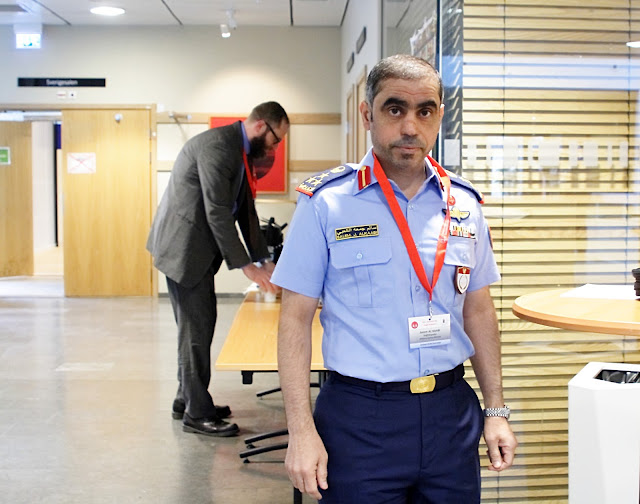Mr Winther spoke about his research project, Legal Aspects of Influence Operations. He explained to the audience that he defines influence operations as "the use of information to influence individuals to certain behaviour". The purpose of the research project is to compare legal consequences in international law in armed conflict, occupation and military operations below the threshold of armed conflict.
Next speaker was Professor Dr. Marco Odello (Reader in Law and Director of International and External Engagement at Aberystwyth University, UK). The topic was human tafficking and peace operations, and Professor Odello talked about the legal aspects of two central legal documents in fighting human trafficking: Protocol to Prevent, Suppress and PunishTrafficking in Persons (also known as the Palermo Protocol), and the UN Convention against TransnationalOrganized Crime. Professor Odello emphasized that the Protocol must be interpreted in the light of
the Convention. There are also possible links between trafficking human beings (THB) and sexual exploitation abuse (SEA), and we need to identify and recognize such links between these two crimes.
 |
| Professor Dr. Marco Odello. Photo: Zarah Abrahamsson |
Staff Brigadier Salem Jumaa Rasheed Al Kaabi (Director of the Military Justice Directorate, United Arab Emirates) gave a presentation on the development of the newly established military justice system in the United Arab Emirates.The vision was to realize a leading position on the level of contemporary military judicial systems that is transparant and accountable. One of the purposes of establishing the system was due to the difficulty of civil public prosecution handling
crimes committed at military camps and units due to their confidentiality and
privacy. Military prosecution members or the military judges
have a better knowledge of military life.
 |
| Staff Brigadier Salem Jumaa Rasheed Al Kaabi. Photo: Zarah Abrahamsson |
Arne Willy Dahl (Judge Advocate General, ret., and Honorary President of the International Society for Military Law and the Law of War, Norway) gave a speech on the development of the Oslo Manual. The first meeting was held in 2004 and the final expert meeting of group of experts will take place in June 2017. ISMLLW a session in Namibia 2008 where the not yet final HPCR Manual was presented for comments to the African
region. The president and members of the ISMLLW
participated in the project in their personal capacity. Members the Board to the Society are in the group of
experts of the Oslo manual. This means that even though there no formal cooperation, but there are some
overlaps.
 |
| Arne Willy Dahl. Photo: Zarah Abrahamsson |
The Seminar continued with a speech by Ambassador Dr. Marie G. Jacobsson (LL.D., Principal Legal Advisor on International Law, Swedish Ministry for Foregin Affairs; Former Member of the United Nations Intenational Law Commission; and Special Rapporteur for the topic Protection of the environment in relation to armed conflict; Sweden). Dr. Jacobsson spoke in the capacity of former Special Rapporteur and gave a presentation on the development of awareness of the proction of the environment in relation to armed conflict. She also talked about the work of the ILC on the matter, and that the next step for the ILC is the adoption of the Commentaries to the Draft Principles of the topic Protection of the environment in relation to armed conflict. In 2018 there will be a debate in the 6th Committee, and product is estimated to be finalized 2019-2021.
 |
| Ambassador Dr. Marie G. Jacobsson. Photo: Zarah Abrahamsson |
/Zarah

